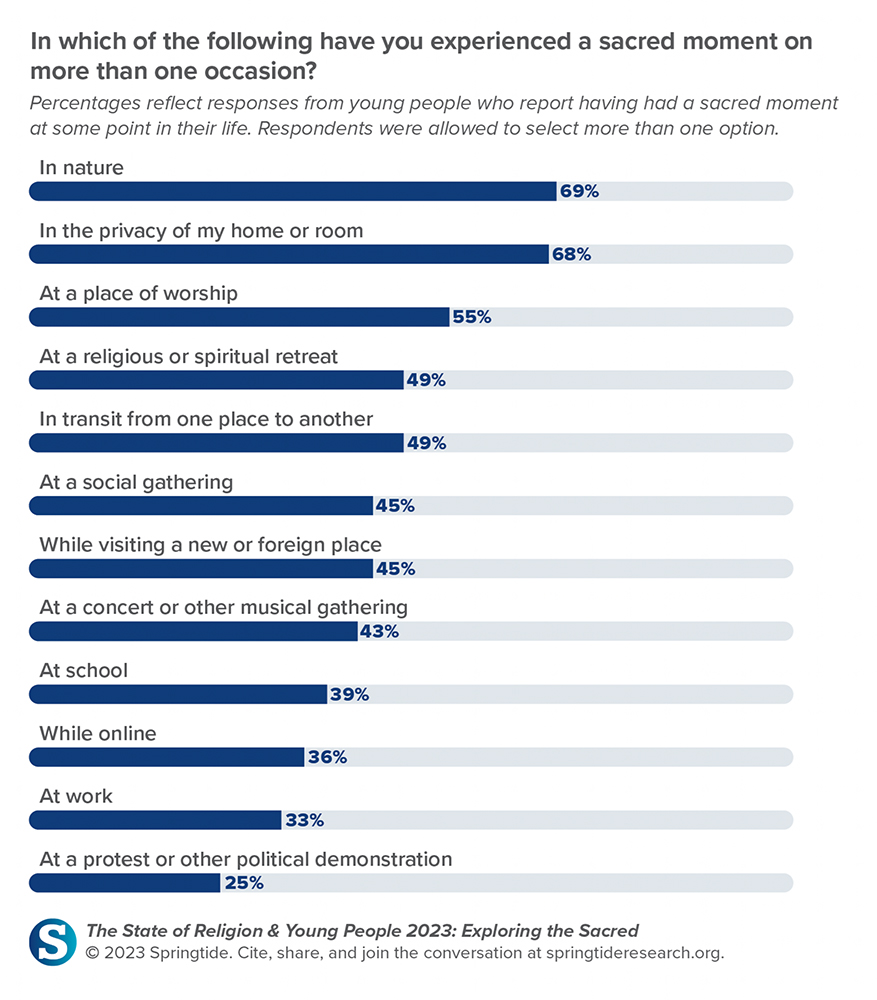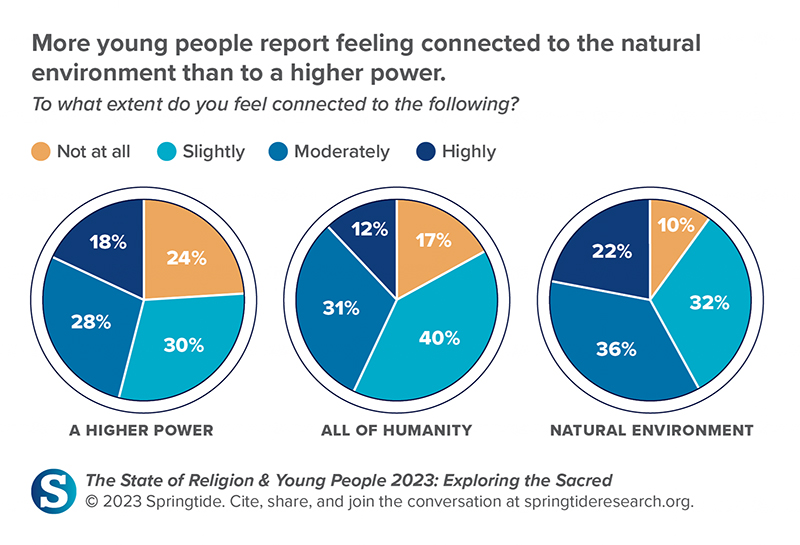Young People Define ‘Sacred Moments’ Broadly: From God to Nature to Relationships
‘Inviting young people beyond the traditional and typical provides room for them to experience something beyond the ordinary,’ a Springtide Research Institute report states.
News Story by Adelle M. Banks | Religion News Service
A majority of young Americans from a variety of faiths and no faith say they have experienced a sacred moment, according to a new survey, but their definitions of what is sacred may not line up with those of their parents or grandparents.
Springtide Research Institute’s “The State of Religion & Young People 2023: Exploring the Sacred” pushes back on the notion that Gen Z exhibits a simple disinterest in matters of the divine or the spiritual. Some 55% of the more than 4,500 people ages 13 to 25 who were surveyed told Springtide’s researchers that they have discovered what Springtide called “experiences that evoked a sense of wonder, awe, gratitude, deep truth, and/or interconnectedness in your life.”
Of those who had, 69% said they had experienced a sacred moment more than once in nature, 68% said they’d done so in the privacy of their home, and 55% said at a place of worship. (Respondents could select more than one option.)
Besides answering the survey, conducted in October 2022, almost three dozen submitted to interviews with researchers who listened to their descriptions of these moments.

Tricia Bruce, director of the Springtide Research Institute, said the report highlights “the prevalence and the overlap of the sacred in nontraditional spaces” even as, increasingly, young people say they have never crossed the thresholds of houses of worship.

“Certainly, we might expect young people to tell us, ‘Yes, I’ve experienced the sacred when I attended a religious service or in prayer,’ and they do, but they also told us ‘I experienced the sacred in nature,’ ‘I experienced the sacred when I got into college,’ ‘I experienced the sacred in a virtual connection,’” Bruce told Religion News Service in an interview.
“Creative spaces that we may not think of as sacred themselves, or as religious, or we may not materially construct as such, young people are telling us that, in fact, that’s where the sacred lives for them.”
Nearly a third of those surveyed — 31% — told Springtide they had never participated in a spiritual or religious community. Also, 72% of young people trust organized religion only somewhat (45%) or not at all (27%).
Bruce said the report has implications for faith leaders, particularly youth ministers, who may have been focusing on answering the question “How do we get young people back?”
Clergy might want to redefine what they consider sacredness, she said. “If we’re looking for the sacred, maybe for young people it does mean going together to have these experiences in these places and beginning to open wide the world as a potentially sacred place through those personal, relational and extraordinary moments.”
For example, Springtide found that 56% of young people said they considered their daily or weekly engagement in art as religious or spiritual practices, as did 54% of those who spent time in nature, 49% of those who read and 45% of those who prayed.

In interviews for the report, the top five terms voiced by young people defining “the sacred” were: special, relationships, places of worship, religion and God.
The report urged faith leaders and other adults who work with young people in religious or secular settings to consider fostering what Springtide called a “sacred sensibility” by helping them connect to the divine in new ways, build close relationships with others and feel emotions that contribute to well-being.
In interviews, young people said they were yearning for such opportunities, “even if they make me uncomfortable,” said one respondent.
Among the ways adults can answer those requests, Springtide suggests, is to listen to how young people define sacredness and be vulnerable about expressing their own faith, which could help those younger than them on their own spiritual journeys.
“Inviting young people beyond the traditional and typical provides room for them to experience something beyond the ordinary,” the report states.

Other findings about young people from the 72-page report include:
- 68% say they are at least slightly religious (32% slightly, 25% moderately, 10% very).
- 78% say they are at least slightly spiritual (32% slightly, 29% moderately, 17% very).
- 28% say they have become more spiritual or religious over the past two years.
The research is based on a sample of 4,546 young people ages 13 to 25 with a margin of error of plus or minus 2 percentage points. The respondents included 62% ages 18 to 25 and 38% ages 13-17. The data, collected in October 2022, is nationally representative for age, gender, race/ethnicity and region. But the report notes it is unclear how representative it is about religion so “data are therefore best understood as tracking broad patterns rather than providing precise point estimates.”
Springtide, a Minnesota-based research institute, was founded in 2019 and is rooted in the tradition of the De La Salle Christian Brothers, a Roman Catholic lay religious organization that has focused on addressing the needs of young people.










